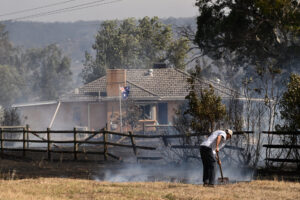Politics Tony Abbott picks his fights, and loves, on the basis of the enemies he will enrage. This time he’s decided to love coal, but he has also enraged key sections of the National Party.
First published in the Australian Financial Review – here.
As the coal price continues to fall, the financial case for building the enormous Shenhua coal mine seems, to put it politely, unclear. And as policymakers struggle with what we might export post-mining boom the economic case for building an enormous new coal mine on prime agricultural land seems even more, shall we say, unclear.
When governments make strange decisions there is usually a political motive; think Tony Abbott offering $16 million of taxpayers’ money to Cadbury to “encourage tourism” in a marginal seat. But when it comes to the Shenhua coal mine in NSW’s Upper Hunter not even the local member, Barnaby Joyce, thinks it’s a vote winner.
It gets worse. Not only is the disgruntled local MP the Minister for Agriculture, he’s also the deputy leader of the Nationals. And not since John Howard took machine guns off farmers has an issue upset the National’s voter base as much as building coal mines and coal seam gas wells on farmland.
So what on earth is the government doing? Has ‘the world gone mad’? Surprising as it may seem, Tony Abbott is simply fighting for something he is passionate about.
Contrary to popular belief, many politicians think that there are more important things in life than winning votes. Keating believed that privatisation was worth fighting his base for. Howard lost a federal election fighting for Work Choices. And Tony Abbott will fight to his last backbencher for the coal industry.
In the same year his government cut funding for medical research and foreign aid, Tony Abbott declared that coal is “good for humanity”. Once a visible sceptic of climate science, our prime minister now soft-pedals on his criticism of the scientists, but pedals hard when it comes to shifting taxpayers’ dollars towards the coal miners.
Having been elected on a promise to scrap the carbon tax and the mining tax he recently created a $5 billion “northern development bank” to fund uneconomic infrastructure in northern Australia. When asked why his allegedly “small government” party was setting up a bank, Joe Hockey assured us that loans would only be made to unviable projects. Phew.
RENEWABLES IN FIRING LINE
This week the government launched a new attack on popular renewable energy. Not content to simply cut the renewable energy target, Mr Abbott is now demanding that the Clean Energy Finance Corporation stop financing wind and solar which just happen to be the cheapest forms of clean energy. That should help the budget.
Tony Abbott picks issues on the basis of the enemies he will enrage rather than on the problems he will solve. He knew the reintroduction of knights and dames would outrage the voters who prefer Turnbull to himself. He knew attacking Q&A would fire up inner-city voters. And he knows there is no better way to bait greenies than to declare that coal is good for humanity. The PM is reminding his base that he is still their conservative hero even if he won’t touch industrial relations or tax reform.
Barnaby is just collateral damage in Tony Abbott’s battle to define himself via the fights he picks. Like the 26 Coalition MPs who lost their seats in 2007 fighting for Work Choices, Mr Joyce now has the thankless task of explaining to his voters why coal is not just good for humanity, but for their health and their agricultural wealth. It seems Tony Windsor might even run against Barnaby for his old seat again. Ouch.
You can’t become prime minister if you’re not interested in politics. And you can’t achieve anything as prime minister if you are only interested in politics. Mr Abbott’s world view of goodies and baddies has helped him define himself and his party. But the lines in the sand he is so fond of drawing have now cut him off not just from his own coalition partner, but from economics, science and the leaders of the world’s largest economies. The G7 recently stated their intention to phase out their reliance on fossil fuels. Presumably Mr Abbott thinks they are opposed to humanity.
Like John Howard, there is no doubt Mr Abbott will go down fighting. The only question is whether that fight will be with his party, the electorate, or the tide of world opinion. Tony Abbott is willing to fight on a point of principle, no matter how much it hurts his coalition partner. Anyone who says politics is all about opinion polls isn’t watching closely enough.
Richard Denniss is Chief Economist at The Australia Institute. @RDNS_TAI
Related documents
Between the Lines Newsletter
The biggest stories and the best analysis from the team at the Australia Institute, delivered to your inbox every fortnight.
You might also like
Why a fossil fuel-free COP could put Australia’s bid over the edge
When the medical world hosts a conference on quitting smoking, they don’t invite Phillip Morris, or British American Tobacco along to help “be part of the solution”.
Burning homes and rising premiums: why fossil fuel companies must pay the bill
Another summer, another round of devastation: homes lost, communities evacuated, lives upended.
The kind of hypocrisy that has become so normal in Australian politics it almost slips past unnoticed
Governments say the right things about becoming a ‘renewable energy superpower’ and committing to net zero. But they keep approving new coal and gas projects as if the laws of physics don’t apply to Australia.



